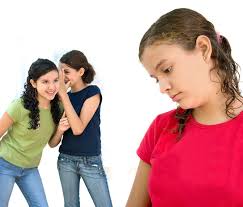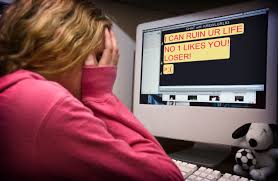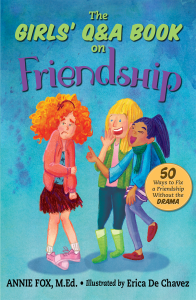|
|
June 6, 2015
For the next few months my blog will focus on answering your parenting questions about raising tweens and teens as well as letting you in on some of the letters I get from tweens and teens. So if you’ve got something on your mind that you could use help with, send it to AskAnnie. (Of course it will be posted without any names, so no worries there.)
Today’s question: How do I keep my 11 yr old away from a bad friend?
 And you still think she’s your friend?! First you’ve got to realize that your definition of a “bad” friend might not be the same as your child’s. In fact, if your child has a history with this friend and is very attached, trying to pry her away will most likely land you smack in the middle of an ugly, pointless power struggle in which you will become the bad guy.
The most effective way to handle something like this is to help your child develop standards for what constitutes a good friend vs. the other kind. You can do it by making observations about what you see. For example, you might say, in a neutral voice, “You know, honey, I’ve noticed, when you come home from Jack’s house you’re usually in a bad mood. Sometimes you take it out on your sister. Sometimes you’re rude to me. I’m wondering what’s going on here?” Right then and there, you create a safe environment for your child to think about what you’ve observed and to let you in on where this chronic “bad mood after being with Jack” might be coming from.
Another approach is to share what you see when the two kids are together. You might say something like this, “I notice when Jack comes over, he seems to be bossing you around. Sometimes I hear bad language and I’m not happy with that. It seems like you two spend more time fighting than getting along. What’s up with that?” After an observational statement like this, simply close your mouth and listen to what your son or daughter has to say.
These techniques let you inside the mind of your child more effectively than provocative statements. (“You don’t actually like that awful boy, do you?!!”) Loaded questions like that don’t go over well with tweens and teens.
If you have good reasons, you are also perfectly within your rights to say, “Your friend is no longer welcome in our home and here’s why…” That conversation can be an eye-opener for your child and provide lots of food for thought.
Bottom line, the best way to influence tweens and teens in the direction of more positive friendships is to make neutral observations so the conversation can open up rather than shut down. That’s how to infuse your child with essential information about what it means to be a real friend.
I hope this helps. And until next time, happy parenting.

May 13, 2015
by Amy Williams
Amy Williams is a journalist based in Southern California. Mom of two, she uses her parenting experience to help other parents raise their children to be the best that they can be. You can follow Amy on Twitter and Facebook.
 Why don’t they leave me alone?! According to Chinese tradition 2015 is the year of the Sheep. I hope it’s better than last year, which I called The Year Of The Bully.
At the start of 6th grade our son had a physical altercation at football practice. The harassment continued at school, extracurricular events, and on Social Media. We didn’t know because our son didn’t let us in on it, a typical response from tweens and teens who are being targeted.
He’d come home from practice upset, shirt torn, and occasionally with missing his cleats. At first we chalked it up to the rough nature of the game and forgetfulness. But other things indicated something was wrong. Some of the puzzle pieces we observed:
- Our son frequently complained about stomach aches and found it difficult to sleep at night.
- He was visibly upset and often would erupt in anger toward his younger sibling for no reason.
- We received emails from his teacher’s about his behavior and falling grades.
- He didn’t ask for friends to come over or to meet up at the movies.
- He suddenly stopped wanting to play on his tablet, the family computer, or use his online account with his gaming system.
- He would cry and refuse to go to Scouting functions or Church activities.
Looking back I can’t believe how blind we were. He was clearly exhibiting signs of being bullied at school and online.
One day I picked him up after football practice. Waiting by the field, I watched our son interact with his teammates. He walked barefoot to the van, desperately trying to hold back his tears. Finally, he let it all out. We felt terrible that we had failed to keep our child safe, but now, we could help and we got right to it.
Our first action was to alert his teachers, bus drivers, and school administrators. It was comforting to know there were extra eyes and ears to monitor the situation. I had a wonderful conversation with the principal who changed the seating chart for the bus ride, changed how the children lined up for lunch, and added a few more sessions about bullying into their counseling rotation. She was trying to educate students on the differences between positive ways to interact vs. aggressive behaviors.
Because 1 in 3 children are victims of cyberbullying and over half don’t report it to an adult, we began an open dialogue with our son. To protect himself, he changed his profile and names on Social Media and gaming sites. During the beginning of our journey, we opened and read all messages together and limited online contacts to friends and family only. We began to actively monitor his Internet and cell phone activity, using a convenient app that allows us to view all his accounts in one place. We also started interacting online with our son so the kids who were targeting him couldn’t miss our presence. Finally, we made a rule that digital technology would only be used in our common living area, no more kids online in isolation (exactly what harassers hope for.)
With a little effort and a lot of emotional coaching, our son is doing very well. He enjoys school again and now happily interacts with his friends online. His former harassers have improved their behavior, too. They probably didn’t understand they were crossing a line. All in all, with this situation behind us, I’d like to believe this experience will foster my son’s empathy and emotional fortitude to handle adversity.
Goodbye, Year of the Bully. Hello, Year of the Sheep. May it be lucky and prosperous for our family and yours.

April 23, 2015
 A Good Use of Power In our 40 years together, David and I have read many books. Add another hundred or so books on tape we’ve consumed on road trips. Yep, we’re addicted to good stories. So it wasn’t too weird when, after a business trip to Florida and a side trip to Universal’s Wizarding World, we decided to re-read all the Harry Potter books… aloud… to each other.
Starting in mid-December, I’d read a couple chapters over breakfast each morning. At dinner, with wine and candlelight, I’d read another chapter or so. If we were driving for more than 20 minutes in any direction, I’d read aloud in the car. (Yes, I can do that without barfing. Lucky me.) At the end of each day we’d watch the film adaptation of the current book, making sure to stop when we got to a new part (i.e., a section of film we hadn’t yet read.)
To date we’ve completed six books and six films. (When we get into something we really get into it.) We’re now half-way through Book 7.
Ever since the kids of Hogwarts took their education into their own hands, I’ve been thinking about the Dark Arts as it relates to the dark side of humanity. While we rarely hear about jinxes or debilitating spells, we’re plenty aware of public humiliation and shaming in social media. Character assasination is a curse, high on the list of Dark Arts. So how do we defend ourselves against the real and present danger of social garbage? How do we teach our kids to defend themselves, online and off, from the hostility of their peers? Where is Harry Potter when we need him?
When I think about what it means to defend oneself, I picture someone standing up for their rights or the rights of others and actively fighting back against the vitriol. But there is inherent danger when one uses vitriol to fight vitriol. The weapon we use has the power to infect us and make us more and more like the perpetrators we seek to vanquish. We can so easily become the enemy. Doing the right thing in a good way isn’t easy.
How do you help your children defend themselves against the prevailing Culture of Cruelty? How do you teach them not to succumb to its ways? Post here and let’s get into it. You can also follow my tweets at @Annie_Fox and @GirlDramaChat. Every Friday you can join the conversation as I host #girldramachat, a weekly Twitter chat (11AM PST) to help parents/teachers/counselors support girls thru friendship drama w/compassion, respect & social courage.

October 22, 2014
As some of you know, I’m currently on a blog tour to spread the word about The Girls’ Q&A Book on Friendship: 50 Ways to Fix a Friendship without the DRAMA. If you are female (any age), and/or if you are raising a daughter, teaching or coaching girls or you’ve got a sister, a niece, etc., I’m guessing you know about girls’ friendship DRAMA. Destructive lunacy, right?
 The Girls’ Q&A Book on Friendship empowers girls to make choices they feel good about. For the next several weeks, I’ll be highlighting some of the friendship questions my gracious blog tour hosts tossed in my direction as I stopped at their site. No softballs here!
This question comes from the dynamic educator and psychologist, Louise Masin Sattler ( @LouiseASL )
Louise: Do you think we are making strides in reducing bullying in the schools? And are girls worse than boys with bullying?
Annie: Yes, of course we are making strides. Yippee! Progress should be celebrated. Are those strides being made universally? No. Is the progress happening quickly enough? Hell no! There are still many schools where teachers bully students and where teachers turn a blind eye and a deaf ear to students making sexist, homophobic, and racially-charged comments to other students. There are still school administrators who shrug and tell distraught parents of targeted students, “Kids will be kids.” or “Teen girls are just mean. What are you going to do about it?” (Actual statements made by school administrators as reported to me by extremely frustrated parents.)
Are girls “worse” than boys with bullying? I don’t believe so. Both girls and boys are afflicted by Peer Approval Addiction in equal measure. Both genders struggle to do the right thing while simultaneously feeling compelled to do whatever it takes to fit in… including stuff they aren’t particularly proud of. The difference, if it exists at all, may be in the methodology girls and boys use to “take down” peers, online and off. That said, the seeds of compassion and empathy are equally prevalent in boys and girls. So, even though I wrote this book for girls, both boys and girls need to understand that their choices matter… in peer relationships and in life.
Read more of Louise’s Q’s and my A’s at LouiseSattler.me
 — Older Posts »
| |















